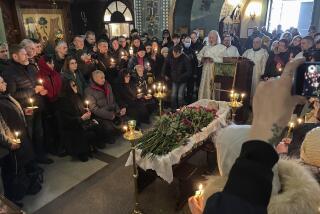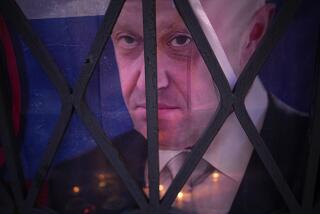Gorbachev Leads Mourning for Sakharov: ‘Man of Conviction, Sincerity’ : Soviet Union: Words of praise come from admirers, friends and others who often opposed the outspoken Nobelist’s human rights stands.
- Share via
MOSCOW — President Mikhail S. Gorbachev led the Soviet Union on Friday in mourning Andrei D. Sakharov, the nuclear physicist whose unremitting campaign for democracy and human rights had made him the conscience of the nation.
Describing the one-time dissident as “a man of conviction and sincerity,” Gorbachev said that Sakharov’s death was a “very great loss” for the country.
A brilliant scientist, who first worked on the Soviet hydrogen bomb and then turned his talents to nuclear energy, Sakharov for more than 20 years had struggled for greater democracy in the Soviet Union and the observance of fundamental human rights here.
Sakharov died Thursday evening, apparently of a heart attack, at the age of 68. He had gone to his study to prepare a speech on the country’s economic crisis for delivery to the Congress of People’s Deputies of which he was a member. His wife, Yelena Bonner, found his body on the study floor.
One of the Soviet Union’s most prominent dissidents through the 1970s and into the 1980s, he had lived to see many of his hopes fulfilled as perestroika , Gorbachev’s program of political and economic reforms, began to restructure Soviet society.
And, in a measure of the scope of those changes, Sakharov was playing a key role in helping shape the emerging political system, admonishing Gorbachev whenever he thought the Soviet leader was straying from the original course of the reforms.
“Academician Sakharov during this time of perestroika had his mission, his role,” Gorbachev said, “and that we all understood.
“He was not some sort of political intriguer. He was a person who had his own ideas, his own convictions, which he expressed openly and directly. This does not mean I always agreed with him, though on many things we did agree.”
Gorbachev stood with other members of the Congress of People’s Deputies at their session Friday to pay tribute to Sakharov, with whom he had clashed there only Tuesday on the future role of the Communist Party.
“It was possible to agree or not to agree with him,” Gorbachev said, “but he was a very sincere man. This is a very great loss for society.”
Vitaly I. Vorotnikov, a Politburo member presiding over the session Friday, told the deputies that Sakharov had been “one of the country’s greatest scientists and a major public figure.”
“Everything that he did was dictated by his tireless conscience and his deep humanitarian convictions,” Vorotnikov said.
Dmitri S. Likhachev, who himself is revered as one of the country’s leading scholars, told the deputies, “With Sakharov’s death, a part of our heart has departed from us.
“We could agree or disagree with him, but he was a man of absolute sincerity and absolute purity,” Likhachev said, “and this led to his achievements in science and his position in public life.”
Awarded the Nobel Peace Prize in 1975 in recognition of his human rights activities, Sakharov was sent into internal exile in the Volga city of Gorky early in 1980 when his criticism, particularly of the Soviet Union’s military intervention in Afghanistan, grew too much for the late President Leonid I. Brezhnev. He was released by Gorbachev in December, 1986.
Challenged during the first session of the Congress, where he represented the Soviet Academy of Sciences, he declared that he had no regrets about the difficult path he had followed. “I am proud of this exile in Gorky,” he said. “I wear it like a medal.”
Age and poor health, resulting partly from two prolonged hunger strikes while in Gorky as well as years of official harassment, had limited his activities since his return to Moscow three years ago, and Sakharov said he wanted to devote his remaining years primarily to theoretical research in nuclear physics.
But the development of the Soviet parliamentary system had drawn him deeply back into politics over the past nine months as he worked to ensure that the pledged reforms were implemented and there was no return to past.
He had seemed tired recently, and friends said that he was suffering again from angina. Yet, he continued with a punishing pace of meetings, political rallies, legislative work and foreign travel.
Vitaly A. Korotich, editor of the crusading weekly magazine Ogonyok, said that the Soviet Union had lost much in Sakharov’s death. “We never had a moral leader at this level,” Korotich said. “His death is a major tragedy for democracy.”
Other tributes came from across the Soviet political spectrum.
Boris N. Yeltsin, the radical populist, who together with Sakharov and opposition deputies, helped form the Inter-Regional Group of Deputies, called him “the people’s conscience.”
“All honest people in the Soviet Union and the world will grieve for him,” Yeltsin said. “Sakharov stood up all his life for justice and truth. He never betrayed the high moral principles to which he adhered, irrespective of the political situation.”
Yegor K. Ligachev, a senior member of the Communist Party’s ruling Politburo and the target of much criticism from Sakharov, acknowledged his differences with him but said, “He did much for the country, and I was very well disposed toward him as a person.
“We adhered to different views and positions, but this is only natural,” Ligachev said. “It is always necessary to show mutual respect and make your points by argument, not by calling each other names.”
Yevgeny M. Primakov, a candidate member of the Politburo, was appointed to head a special funeral commission and visited the apartment to talk with Yelena Bonner, Sakharov’s widow and associate in his human rights campaigns.
Provisional plans call for the formal funeral to be held Monday at the Academy of Sciences Physics Institute, where Sakharov worked, with a bigger gathering at the Luzhniki Stadium, where Sakharov addressed many political rallies in the past year and a half.
The body, which will lie in state at a youth palace Sunday, will be buried in a family plot in a suburban cemetery.
In addition to Bonner, the survivors include a son and two daughters from his first marriage, as well as Bonner’s son and daughter from a previous marriage.
More to Read
Sign up for Essential California
The most important California stories and recommendations in your inbox every morning.
You may occasionally receive promotional content from the Los Angeles Times.













